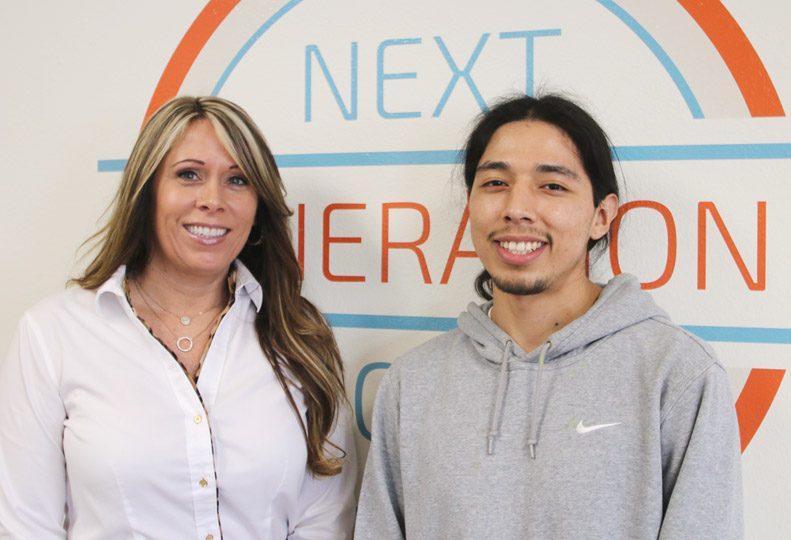
Home » Next Generation Zone prepares young adults for careers
Next Generation Zone prepares young adults for careers
Spokane center expects another increase in visits

April 13, 2017
Sherman Birdtail says he doesn’t know where his life would be without the educational, employment, and emotional support he’s received from the staff of Spokane’s Next Generation Zone, a career center for young adults.
“I came in at 16 to get my GED, and I got it, but I was still young and crazy,” says Birdtail, now approaching 25.
“Three years ago, I came back, but this time, I was ready to do something different. I wanted to learn and get the skills that I needed to do something better than what I’d been doing with my life,” he says.
Through Next Generation, which has its main offices in the Gateway Building at 901 E. Second, Birdtail says he’s working toward studying to be a rehabilitative counselor and career specialist. He currently has a job working at Spokane-based LCD Exposition Inc. as an event staffer, and he recently secured a job as a peer mentor at Excelsior Youth Center.
“I’m one of the older people down here,” Birdtail says of being at Next Generation and 24 years old.
“I love interacting with people who have been in the position I was in,” he says.
Established by the Spokane Area Workforce Development Council in 2007, the Next Generation Zone combines education, career skills and training, and employment and community resources to inspire young adults between 16 and 24 to find and pursue career goals.
Next Generation offers several youth-focused programs, providing its clients with the chance to finish their primary education and help them into postsecondary placement or to secure their first professional job.
Next Generation also operates in smaller space at the AmericaCorps office located at 2424 E. Riverside.
With an annual budget of $2 million, Next Generation receives public funding from federal, state, and local sources, as well as private donations, says Dawn Karber, COO of the Workforce Development Council.
Now, with well over a dozen partners—including businesses and nonprofits here—Next Generation in 2017 expects to have a minimum of 4,500 visits from young adults looking for services, says Next Generation director Trina Clayeux. Last year, Next Generation had 3,800 visits, and in 2015 it recorded 2,400 visits, she says.
Next Generation counts visits to its centers and not individual customers.
Clayeux attributes the increase in visits to a combination of factors.
“The implementation of our programs now keeps them coming back on a more consistent basis because we want them to be continuously engaged,” she says.
Word-of-mouth advertising and an increased desire on the part of many young adults to secure employment beyond entry-level work, plus the pursuit of careers, also have contributed to more Next Generation visits, Clayeux says.
Karber says Next Generation originally began with just four community partners, Goodwill Industries of the Inland Northwest, Career Path Services, Northeast Washington Educational Service District 101, and the Community Colleges of Spokane, serving 300 young adults.
Next Generation has a total of 24 employees, 16 of them at 901 E. Second and the rest at 2424 E. Riverside. Its employees are primarily career specialists and counselors.
“The biggest barrier to employment for young adults is the fact they’re young adults,” Clayeux says. “They don’t have a work history and often aren’t sure what they want to do.”
Karber says it’s critical for the community to play an active role in assisting young adults to complete their educations, pursue careers, and become economically engaged in the community to replace the veteran workers approaching retirement age.
“There are associated costs to communities with high unemployment rates among young adults,” she says. “If they feel they have to go elsewhere to find work, then that’s taking resources away from their home community.”
Next Generation offers services through programs called Open Doors, YouthBuild Spokane, and the 21st Center Career Academy, as well as providing GED assistance, Clayeux says.
Open Doors pairs job seekers with career counselors, and requires at a minimum, two hours of face-to-face activity, instruction, case management, and weekly status checks with their counselor. The program requires six to nine hours per week of educational and career study for three days a week and offers test-taking workshops, she says.
For an adult seeking to pass the General Equivalency Development test, Spokane Community College offers onsite instruction and support. The four-test series is a rigorous set of work-life assessments in math, reading, sciences, and social studies. A GED-plus program has a focus of transitioning from GED completion to college or career preparation, Clayeux says.
YouthBuild is a certified pre-apprenticeship program administered by Northeast Washington ESD 101. It specializes in working to help young adults overcome generational poverty by affirming a commitment to work, education, family, and community. Soft skills offered by the program include leadership, teamwork, and resiliency training, Clayeux says. Every year, three classes of a dozen young adults are selected for the program after completion of educational assessments and interviews, she says.
Students commit at least half of their time to completing their GED diploma and the other half in either a construction trade or health care track.
Next Generation staff also works with AmeriCorps to place youth in different intensive service positions to learn workplace skills and to become more involved in the community, Clayeux says.
Next Generation is celebrating its third year offering 21st Century Academy, a 36-hour course that prepares young adults for work and postsecondary education.
In the academy, students create resumes, learn to interview and effectively complete applications, develop their own brand identity, learn to network, work toward earning a Microsoft digital literacy certificate, and work toward a National Career Readiness Certificate, Clayeux says.
“Students that successfully complete the career academy are deemed work-ready as far as having the skills and techniques to find, obtain, and keep a job,” she says.
Latest News Up Close Government
Related Articles
Related Products



